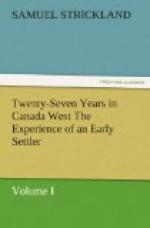The wood-duck is a delicious bird. It makes its appearance early in the spring, as soon as the ice breaks up. Its plumage is very fine—I should say the most beautiful of any of its species. Its head and upper part of the neck are dark green; from the top of the head a long crest depends, richly variegated with green, white, and dark purple feathers. The lower part of the throat and breast is cinnamon speckled with white, but under the wings and sides towards the tail, grey, speckled and fringed with black; the back of the wings dark blue and black feathers. The wood-duck frequents close-wooded streams, little bays, and nooks, sitting upon old logs or the limbs of trees which have fallen into the water. It feeds on the wild rice, and is very fat from the middle of August to November, when it migrates to a warmer climate. This kind of duck is more easily approached than any other. The sportsman should be seated near the centre of a small canoe, his gun lying before him ready cocked, when he should paddle very cautiously through the rice, keeping his head as low as possible. A person who understands the management of a canoe can generally get within twenty-five or thirty yards before he is seen, which gives him ample opportunity to put down his paddle and take his gun, in time to fire both barrels. In this manner I have often killed from fifteen to twenty brace in a few hours.
After dinner we hired a skiff and proceeded on our voyage. The lake was calm, so we made good progress, passing the Indian village belonging to the Mississauga tribe of Indians, a branch of the Chippewas, which I shall have occasion to speak of hereafter, Pantaush’s point, Designs Bay, and the embouchure of the Indian river; and just at dusk landed opposite my friend’s house, pretty well tired, though much delighted with our day’s journey. We were received with a welcome such as only a backwoodsman knows how to give. In half an hour I felt as much at home as if I had belonged to the family.
During my stay here, which was upwards of a week, I amused myself with fishing and shooting. The fall and winter duck were beginning to come in from the north, a sure sign that hard weather was close at hand.
We had had an early spring and a long warm summer. Generally speaking, the ground does not close till about the middle of November; but this year the frost set in much earlier. It did not, however, continue, for the ground again opened, and we had nearly two weeks of beautiful Indian summer in the early part of November.
On the 17th the ice was sufficiently strong to skate upon. On the 27th day of October the first hard weather commenced, and as there was some fear of the lake freezing, we determined to start for Cobourg the following morning. I accordingly made the necessary preparations, and hired an old man-of-war’s-man, one Robert Redpath, to row us up the lake to Tidy’s.




